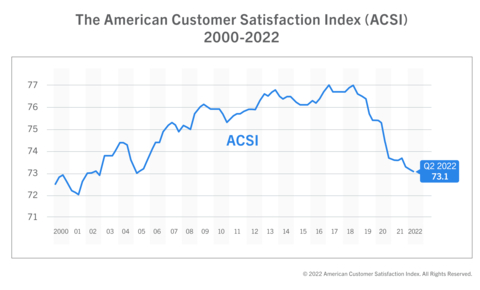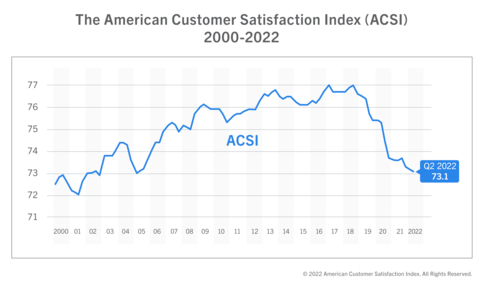ANN ARBOR, Mich.--(BUSINESS WIRE)--Customer satisfaction in the U.S. continues to fall. Not only has it declined for three consecutive quarters; it has plunged by 5% since 2018—the largest descent in the 28-year history of ACSI. It now stands at 73.1 (on a 0-100 scale) and has slumped in 12 of the past 15 quarters.
GDP has declined for the past two quarters as well. In fact, the overall pattern is similar to what happened during the 2009 financial crisis and the emergence of COVID-19 in 2020: Both GDP and ACSI decreased.
However, what we have now is different and more complicated than previous economic contractions. It is unusual that both quantity and quality of economic output, as reflected by GDP and ACSI respectively, fall in a strong labor market. It is also unusual that consumer spending is increasing. Not only is it the largest component in GDP, but it is also associated with increasing - not decreasing - customer satisfaction. But that’s the economy we have today – full of contradictions. To make things worse, inflation is probably even higher than reported because it is not fully adjusted for the decline in quality, especially in services, as evidenced by the ACSI data.
“Increasing interest rates is the conventional prescription for curbing inflation and cooling an overheated market. Yet, the current economic situation presents unconventional challenges,” said Claes Fornell, founder of the ACSI and the Distinguished Donald C. Cook Professor (emeritus) of Business Administration at the University of Michigan. “If shortages, shipping problems, labor shortages, and other supply issues are causing demand to be greater than supply, prices may continue to spiral upwards. Paradoxically perhaps, customer satisfaction will then matter less for business. In a shortage economy, companies don’t need to compete much for customers. Rather, consumers compete with one another to be first in line and to get what’s available.”
At the same time, some industries now suffer from the opposite problem: Overstocking with more inventory than warranted by demand. Thus, prices will come down for some products. While strong demand due to high levels of customer satisfaction tends to increase a company’s pricing power, the same is true in a shortage economy, but regardless of customer satisfaction. That is, both overstocking and falling customer satisfaction put pressure on price. The paradox here is that falling customer satisfaction may help curb inflation, but only in sectors without supply problems. However, the industries that have seen the sharpest drops in customer satisfaction (since 2018) are those that have supply constraints, mostly with respect to labor. Examples are hospitals (-9%), hotels (-7%), and express delivery (-9%). Industries with large price increases also have more dissatisfied customers—for example, gas stations (-8%), beer (-7%), and utilities (-5%). At the opposite end of the spectrum are industries that depend less on service. To the extent that they can avoid having customers actually requiring service, they have seen an increase in ACSI—for example, customer satisfaction for cable television is up by almost 7%, internet services by 3%, and personal computers by 3%.
The national ACSI score (or ACSI composite) is updated each quarter based on annualized customer satisfaction scores for all sectors and industries. For more, follow the American Customer Satisfaction Index on LinkedIn and Twitter at @theACSI or visit www.theacsi.org.
No advertising or other promotional use can be made of the data and information in this release without the express prior written consent of ACSI LLC.
About the ACSI
The American Customer Satisfaction Index (ACSI®) has been a national economic indicator for 25 years. It measures and analyzes customer satisfaction with more than 400 companies in 47 industries and 10 economic sectors, including various services of federal and local government agencies. Reported on a scale of 0 to 100, scores are based on data from interviews with roughly 500,000 customers annually. For more information, visit www.theacsi.org.
ACSI and its logo are Registered Marks of American Customer Satisfaction Index LLC.




